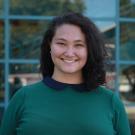
2025 QuIST Graduates
UC Davis Quantum Information Science and Technology programs have trained hundreds of students, from high school to postdoctoral stage. We asked a few graduating students to reflect on their QuIST experiences. Here is what they had to say.

Victoria Norman
Physics Ph.D. graduate now at the University of Cambridge
I am a former PhD student in R-Lab at UC Davis and I'm currently a Postdoctoral Research Associate in the Quantum Optics and Materials Systems Group at the Cavendish Laboratory, University of Cambridge. Outside of my research, I was one of the founders of the Quantum Journal Club that ran for a few years, and was an Associate Instructor for the ECE 289L Introduction to Quantum Technologies course. When starting in QuIST at UC Davis, I was not expecting the breadth of research on QuIST topics being done in Physics and other UC Davis departments. My interactions across these disciplines exposed me to new ideas and potential applications that influence my research choices to this day. The collaborative culture between QuIST research groups on campus also gave me the opportunity to learn how to effectively communicate with other researchers in fields adjacent to my doctoral work both formally through presentations to other groups and informally through coffee breaks. Finally, the emphasis on mentorship and outreach in the QuIST community at UC Davis gave me valuable experience that my current students really appreciate.

Dinesh Nagulapati
Electrical Engineering Masters Student en route to industry
During my time at UC Davis, I engaged with the QuIST initiative through coursework, research, as well as attending a few of the QuIST-hosted seminars and student events. I took courses such as EEC189L and EEC289L, where I not only gained deep theoretical knowledge of the broader landscape of quantum technologies but also completed hands-on projects and lab assignments involving quantum circuit design, quantum algorithms, Qiskit, hardware principles, etc. These labs helped me develop strong practical skills and a deeper intuition for quantum mechanics applied to computation. I also collaborated with the QCaD club members on a project for the iQuHACK MIT2025 hackathon, where I worked on a hands-on project involving quantum algorithms—an experience that gave me valuable exposure to real-world problem solving in the quantum domain. A significant part of my experience was conducting research in the R-Lab under Dr. Marina Radulaski, where I worked on projects in quantum nanophotonics. This experience gave me valuable exposure to the intersection of quantum computing and hardware-level photonics and their simulations. Additionally, attending QuIST-hosted seminars featuring leading researchers provided me with insights into cutting-edge developments across quantum computing and information science. Altogether, the comprehensive ecosystem fostered by QuIST, including coursework, research, labs, seminars and student groups—greatly shaped my research direction to thrive in this field and ultimately helped me in getting an internship at Rigetti Computing as a Quantum Software Engineer focusing on quantum compiler development.